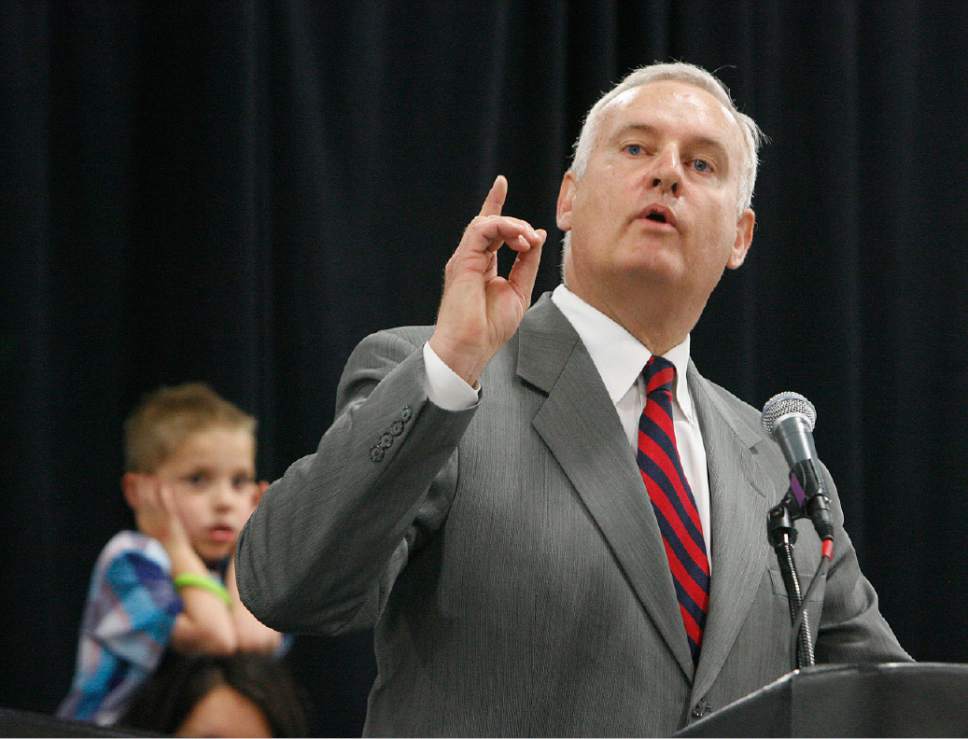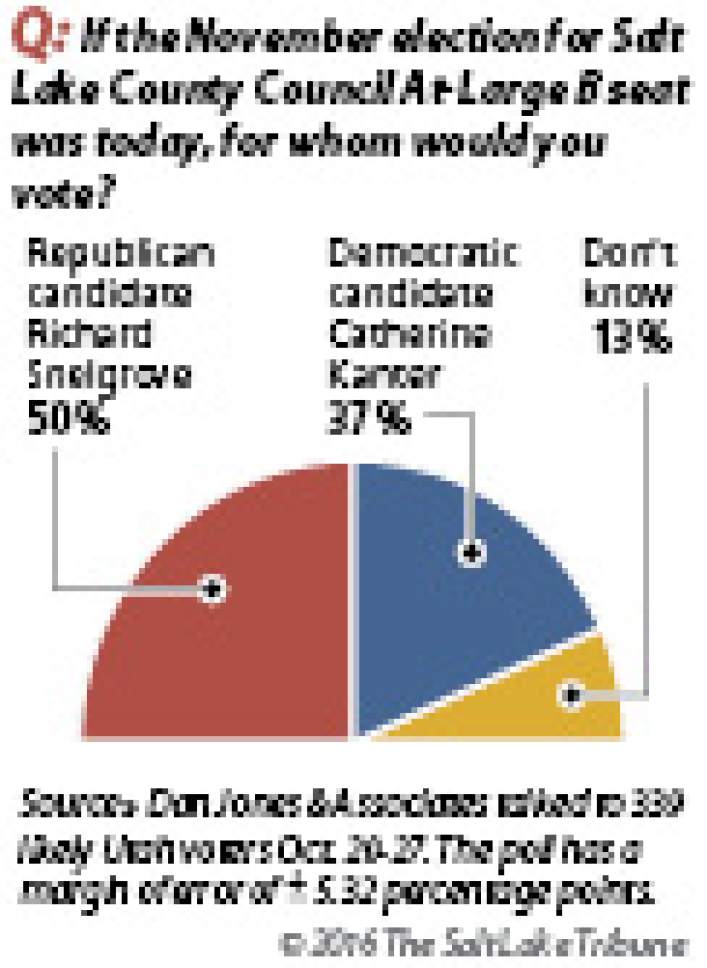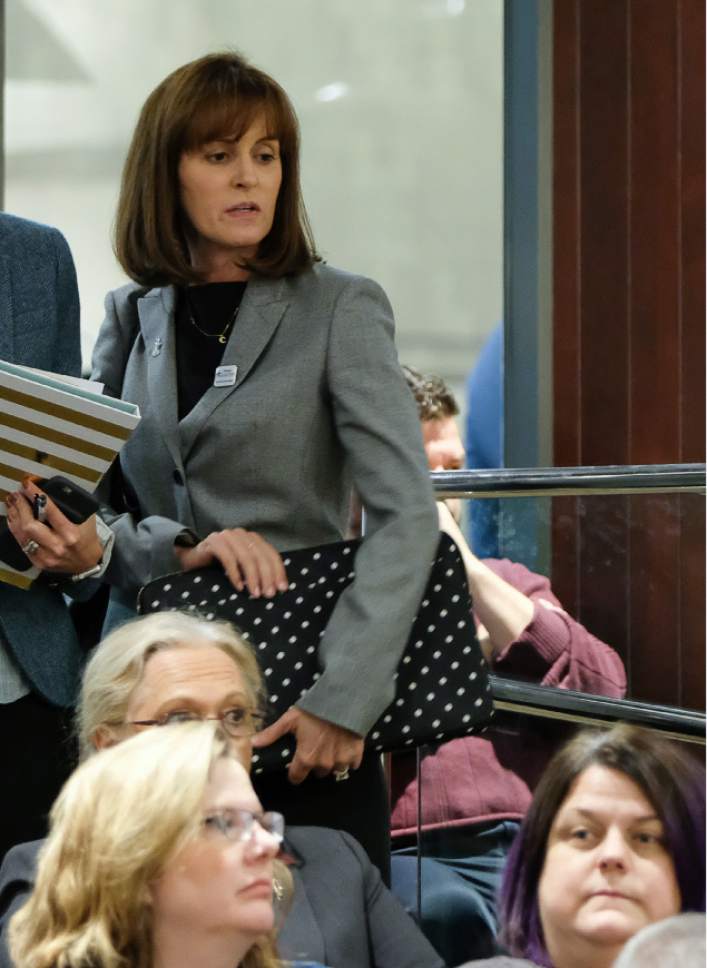This is an archived article that was published on sltrib.com in 2016, and information in the article may be outdated. It is provided only for personal research purposes and may not be reprinted.
Republicans look likely to maintain their 5-4 majority on the Salt Lake County Council with incumbent Richard Snelgrove holding a 13-point lead over Democratic challenger Catherine Kanter heading into the election homestretch despite her huge fundraising advantage, according to a new poll.
The just-released Salt Lake Tribune-Hinckley Institute of Politics poll shows Snelgrove with 50 percent support to 37 percent for Kanter, with 13 percent undecided in their race for a six-year at-large seat.
"That's consistent with our numbers. It doesn't surprise me," said Snelgrove, 61, of Murray, who has served one term on the council. "People are appreciative of my efforts to hold [the Utah Transit Authority] accountable and to demand a high level of transparency in government."
Kanter, 49, from the Granite community at the mouth of Little Cottonwood Canyon, said the numbers do not mirror the sense she gets from being on the campaign trail.
"I remain encouraged and will campaign aggressively," she vowed. "I look at the undecideds, and that's where we're going to focus. I'm confident those undecideds will break our way."
Democratic hopes of regaining control of the County Council — to go along with party colleague Ben McAdams' push to hold onto the mayor's seat — have been elevated this campaign season by indications that Donald Trump's divisive campaign might hurt down-ballot Republican candidates.
Snelgrove was the most vulnerable target on the council, with fellow Republicans Michael Jensen and Max Burdick facing token opposition.
To challenge Snelgrove, Democrats turned to Kanter, a fundraising star who at last count — Sept. 15 — had collected nearly four times as much in contributions as Snelgrove, $206,000 to $55,600. The candidates are scheduled to submit their final pre-election financial disclosure forms Tuesday.
Kanter also has the type of credentials Democrats believed could help sway voters.
A lawyer, she has been raising two sons and working for nonprofits since moving to Utah nearly two decades ago with her husband, Josh Kanter, founder and president of the progressive Alliance for a Better Utah.
Involvement in a neighborhood planning-and-zoning issue led her to a position on the Granite Community Council and, from there, to a seat on the new Mountainous Planning Commission, which largely regulates land use in Mill Creek and the Cottonwood canyons.
"I'm just a regular citizen who realized I had the skills, passion and work ethic to do a good job in political office," she said. "I have spent the last 10 years trying to better our community through nonprofits. I can do that same thing and do it in political office."
Snelgrove, meanwhile, is a small-business owner who runs five travel-related websites out of Snelgrove Travel Center in Layton. He was born into the family that made Snelgrove synonymous with ice cream in Utah, but went in a different career direction. A former Utah Republican Party chairman and one-time congressional candidate, he served for a time as district director for former U.S. Rep. Merrill Cook.
Snelgrove prides himself on cultivating a reputation as the "people's watchdog" during his council tenure.
"I recognize people work hard for their money, and when it comes out of their family budget as tax revenues, they expect it to be spent just as carefully as if it was part of their family budget," he said. "I'm a grass-roots person, a man of the people."
—
Poll breakdown • The Tribune-Hinckley Institute poll was conducted Oct. 20-27 by Dan Jones & Associates among 339 likely voters and has a margin of error of 5.32 percent. It showed voters defaulting to their party affiliation in this race, with 89 percent of Republicans and 84 percent of Democrats sticking by their respective candidates, while independents slightly favored (by 5 percentage points) Snelgrove.
Snelgrove received support from 90 percent of those who consider themselves very conservative, and 76 percent of those who are somewhat conservative; Kanter got 90 percent of very liberal voters and 75 percent of the somewhat liberals; and moderates gave Kanter the edge, 39 percent to 35 percent.
Snelgrove had more support among both men and women, was liked better by older voters and had a huge advantage among active members of The Church of Jesus Christ of Latter-day Saints. Kanter did better among young voters (under 34), non-Mormons and nonpracticing Mormons.
—
Crime and taxes • The primary issue reflecting their disparate approaches to county government involves criminal-justice reform.
Kanter solidly supports McAdams' ongoing plan to invest about $27 million over three years into multipronged efforts to combat the interrelated challenges of homelessness, mental illness and substance abuse.
He received council support on a 6-3 vote to fund the initiative by continuing to collect taxes from a jail-construction bond that was expiring.
Snelgrove was one of three council members voting against the proposal, a position he steadfastly defends.
"It was sneaky and opportunist to pass a tax increase and then to figure out what to spend it for," he said, referring to deliberations earlier this year in which the council backed McAdams' plan to put a big chunk of that money into "Pay for Success" programs that use private investments for startup costs. If the projects are successful, the nonprofit or corporate investors will be repaid with public funds. If they fail, investors' money is forfeited. Program backers maintain this approach will be far less expensive than the current cost of recycling people among between the homeless shelter, jail and the streets.
"It was passed. I wish it complete success. But that doesn't belie the fact that [Pay for Success] is an experiment and we shouldn't be doing experiments with taxpayers' money," Snelgrove said. "It's much wiser and more prudent to see what kind of initiatives had been successful in other counties, adopt those best practices and adapt them for our needs."
Kanter believes Snelgrove's perspective lacks the vision needed to resolve such a complex problem.
"I understand there was that tax-extension issue," she said. "But most people, including [Republican council members] Aimee Winter Newton and Steve DeBry saw the big picture and realized that public-safety concerns outweighed the semantics of 'tax increase' or 'extension.' "
Kanter said Snelgrove's position amounted to little more than a sound bite. "But when you really pick it apart, the result is an underfunding of criminal-justice efforts, which are how we keep our neighborhoods safe."
—
Protecting canyons • While the candidates both profess a deep love for the mountains and canyons, they have different views on efforts by the Mountain Accord process to develop a holistic plan for protecting the central Wasatch Front.
Kanter said Mountain Accord and its proposed transition into a Central Wasatch Commission represent a prudent approach to dealing with the canyons, although some tweaking is needed to assure community members feel more involved.
Snelgrove has greater reservations, contending there has not been enough transparency and openness "for the masses. Only people on the inside track are clued in."







